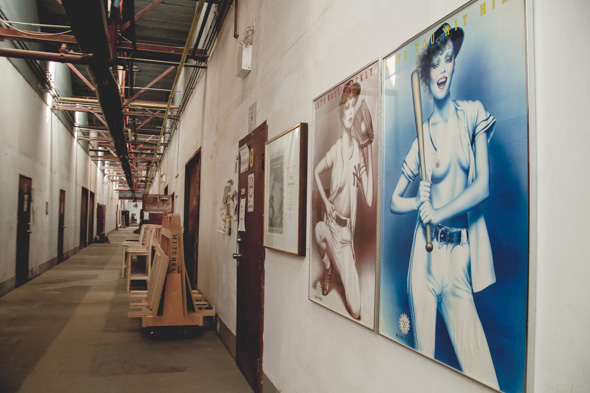 In the midst of a dusty, shimmery Toronto heatwave, I trudge up the slight incline of Dufferin at Queen to meet photographer Denise McMullin. We're going to explore the mystery that is 422 Dufferin, the massive white warehouse, in slightly decrepit condition, just a little bit north of the Dufferin overpass. As we arrive, there's no sign proclaiming the list of tenants and their addresses. Only a few open doors leading to a labyrinth of concrete hallway, with the odd harried-looking artist rushing past.
In the midst of a dusty, shimmery Toronto heatwave, I trudge up the slight incline of Dufferin at Queen to meet photographer Denise McMullin. We're going to explore the mystery that is 422 Dufferin, the massive white warehouse, in slightly decrepit condition, just a little bit north of the Dufferin overpass. As we arrive, there's no sign proclaiming the list of tenants and their addresses. Only a few open doors leading to a labyrinth of concrete hallway, with the odd harried-looking artist rushing past.
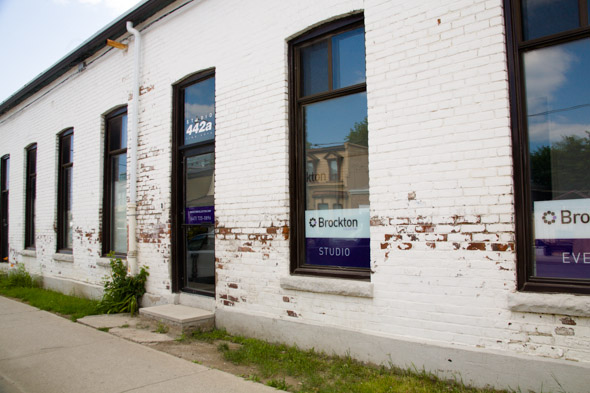 We wander in and poke our heads around a doorframe. A small, bed-headed man bends over a plain wood work table with nothing on it but a bucket with a few pieces of Styrofoam sticking out of it, a roll of packing tape, and a knobbly turquoise sculpture that's broken in half. He mutters and fusses around the table. I knock and tell him what we're up to. "Yeah, yeah," he mutters. "I run the building."
We wander in and poke our heads around a doorframe. A small, bed-headed man bends over a plain wood work table with nothing on it but a bucket with a few pieces of Styrofoam sticking out of it, a roll of packing tape, and a knobbly turquoise sculpture that's broken in half. He mutters and fusses around the table. I knock and tell him what we're up to. "Yeah, yeah," he mutters. "I run the building."
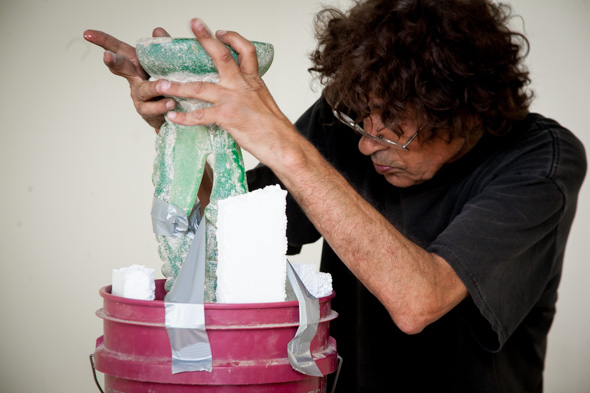 He tells us to come back another day for a tour, but as we stand around and show no sign of leaving, he finishes gluing the sculpture back together and comes over to shake my hand. His name is Alfred Engerer. It's 4 p.m., late in the day. The tenants are all drifting out to pick up beer before they come back to settle in for a night's work, but Alfred stays put to show us around for almost two hours. Many of the tenants aren't in, but of the ones on the ground floor who are, we barge in to meet them.
He tells us to come back another day for a tour, but as we stand around and show no sign of leaving, he finishes gluing the sculpture back together and comes over to shake my hand. His name is Alfred Engerer. It's 4 p.m., late in the day. The tenants are all drifting out to pick up beer before they come back to settle in for a night's work, but Alfred stays put to show us around for almost two hours. Many of the tenants aren't in, but of the ones on the ground floor who are, we barge in to meet them.
No matter the take on it, each business produces some form of art. The first place we pop in to is Dat Salon, which has local paintings all over the walls. Dat is fussing over a woman's updo, asking her how she likes the front curls. His beautiful tattooed co-worker is largely unimpressed with the circus parading through her workspace, but her looks of chagrin don't hurt because she is art, too.
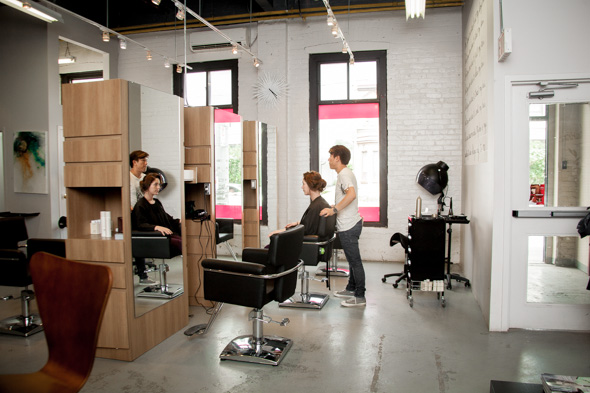 We move on, careening through the hall at mach speed with brave Alfred as our guide. He marches along, shouting out the names of those who own each business and pelting us with historical facts as he goes. There are 44 studios in the building, and they are home to what he says is a precise 144 tenants. We pass storage for The Drake General Store, and Bellwoods Brewery, Ideacious, a company that helps new designers get off the ground, a ceramic collective, kombucha brewers Tonica, a glass studio, a metal milling operation, and no fewer than four wood studios. This all happened completely without pause in Engerer's explanations and story telling.
We move on, careening through the hall at mach speed with brave Alfred as our guide. He marches along, shouting out the names of those who own each business and pelting us with historical facts as he goes. There are 44 studios in the building, and they are home to what he says is a precise 144 tenants. We pass storage for The Drake General Store, and Bellwoods Brewery, Ideacious, a company that helps new designers get off the ground, a ceramic collective, kombucha brewers Tonica, a glass studio, a metal milling operation, and no fewer than four wood studios. This all happened completely without pause in Engerer's explanations and story telling.
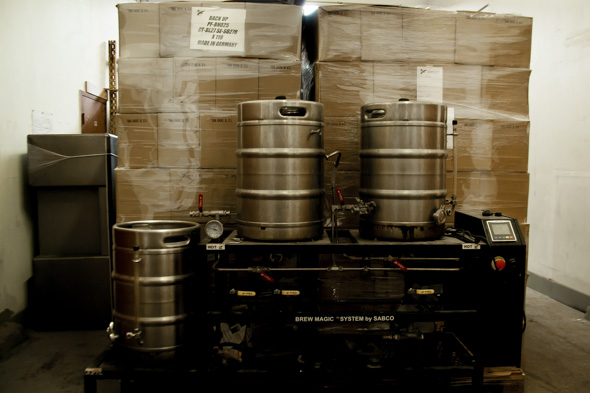 We pass Akin Collective, an art studio and work space, and then we arrive at a door in the middle of the hallway. "Come on in here for a second," he says. "This is my madhouse." We follow him in, squeezing through the narrow space allotted to the doorway. Behind it is a desk and shelves and innumerable projects. It feels like we're in the lair of a mad scientist/beautiful genius/60s export. There's piece upon piece of blown glass work, from spaceships to birds to giant toadstools and pipes. There's a total of 144 feet of blown glass railing; all of it created by Engerer. There's a giant bowl of keys, dusty old copies of The New Yorker.
We pass Akin Collective, an art studio and work space, and then we arrive at a door in the middle of the hallway. "Come on in here for a second," he says. "This is my madhouse." We follow him in, squeezing through the narrow space allotted to the doorway. Behind it is a desk and shelves and innumerable projects. It feels like we're in the lair of a mad scientist/beautiful genius/60s export. There's piece upon piece of blown glass work, from spaceships to birds to giant toadstools and pipes. There's a total of 144 feet of blown glass railing; all of it created by Engerer. There's a giant bowl of keys, dusty old copies of The New Yorker.
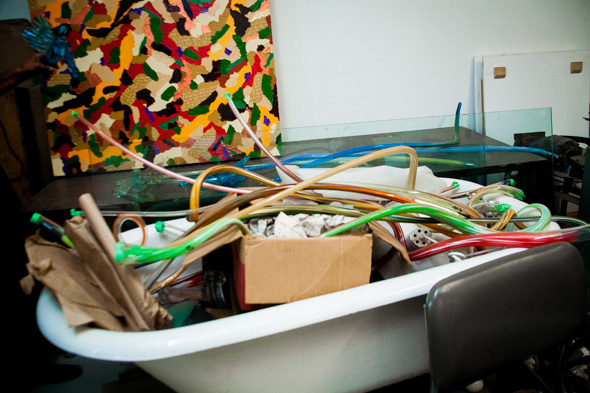 This is Engerer's own personal studio. He acts, of course, like its magical contents are completely unremarkable. The studio is in disarray, though, because the future of the building is largely undecided. A couple of years ago, a new landlord bought the building, and he wants to tear it down and turn it into condos. The building, Engerer says, is one of the last of its kind in Toronto. The oldest part of it was finished in 1880. Its fate—whether it will remain a rambling workspace or be turned into condos — will be decided by City Council in November. If it's decided that 442 Dufferin will be torn down, all that's required is 90 days' notice to the current tenants.
This is Engerer's own personal studio. He acts, of course, like its magical contents are completely unremarkable. The studio is in disarray, though, because the future of the building is largely undecided. A couple of years ago, a new landlord bought the building, and he wants to tear it down and turn it into condos. The building, Engerer says, is one of the last of its kind in Toronto. The oldest part of it was finished in 1880. Its fate—whether it will remain a rambling workspace or be turned into condos — will be decided by City Council in November. If it's decided that 442 Dufferin will be torn down, all that's required is 90 days' notice to the current tenants.
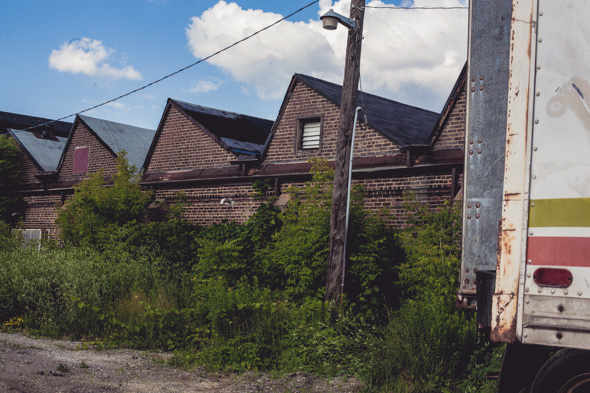 "The condo market is soft," Engerer says, his eyes traveling down to the floor and away from me. "Either way, we could be here for years yet." The building might be saved by Ontario's Employment Lands Protection Act. In terms of protection based on historical value, Engerer says the only thing that could give the building heritage status is its sawtooth roof, which we see later through trespassing in an abandoned lot behind the building.
"The condo market is soft," Engerer says, his eyes traveling down to the floor and away from me. "Either way, we could be here for years yet." The building might be saved by Ontario's Employment Lands Protection Act. In terms of protection based on historical value, Engerer says the only thing that could give the building heritage status is its sawtooth roof, which we see later through trespassing in an abandoned lot behind the building.
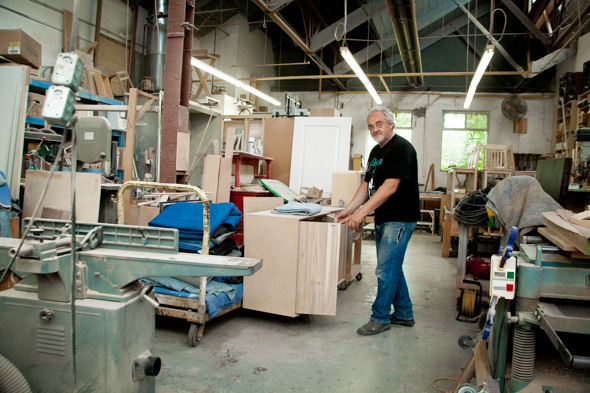 We wander out of his studio and have a quick peek inside Mitchell Group, which is another wood working studio (I lose count of them soon after this), and it smells of sunny sawdust. There are 10 freshly made bar stools lined up outside the door, and the interior of the huge space is stuffed with tables, armoires, dressers, and lots of pieces of wood that will become furniture in good time. "THISAWAY, THE TOUR CONTINUES!!" Engerer bellows after about 30 seconds. We march on out of there. He tells is there's a recording studio for musicians upstairs, but I don't catch many more details, as Engerer is already in the throes of showing us Paus + Grün, a company that makes and designs beautiful one-of-a-kind pieces of furniture out of reclaimed wood and other materials.
We wander out of his studio and have a quick peek inside Mitchell Group, which is another wood working studio (I lose count of them soon after this), and it smells of sunny sawdust. There are 10 freshly made bar stools lined up outside the door, and the interior of the huge space is stuffed with tables, armoires, dressers, and lots of pieces of wood that will become furniture in good time. "THISAWAY, THE TOUR CONTINUES!!" Engerer bellows after about 30 seconds. We march on out of there. He tells is there's a recording studio for musicians upstairs, but I don't catch many more details, as Engerer is already in the throes of showing us Paus + Grün, a company that makes and designs beautiful one-of-a-kind pieces of furniture out of reclaimed wood and other materials.
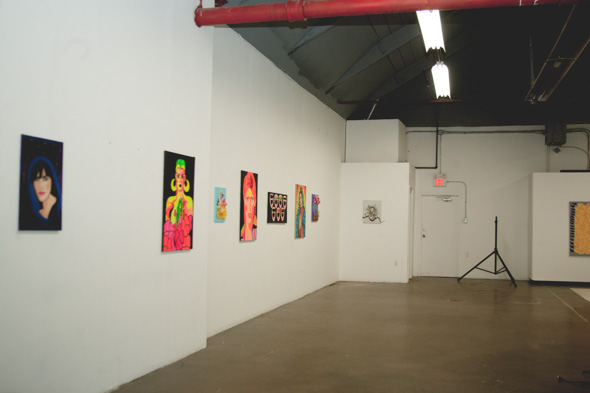 We arrive at Brockton Collective next, and they're in the midst of getting ready for a show of Tresor Ziev's work. Wildly coloured portraits of subjects like Bowie's head hang on the stark white studio walls alongside a series strange masks. They tell me they're focused on not being exclusive in any way, and that their main focus is artist promotion. The dude I chat with pauses to wipe the table down. "There's, like, weed all over the table," he says, rolling his eyes. "Crazy artists." I consider telling him crazy artists make the world go round, but then I decide to shut up, because I can only presume he knows that already.
We arrive at Brockton Collective next, and they're in the midst of getting ready for a show of Tresor Ziev's work. Wildly coloured portraits of subjects like Bowie's head hang on the stark white studio walls alongside a series strange masks. They tell me they're focused on not being exclusive in any way, and that their main focus is artist promotion. The dude I chat with pauses to wipe the table down. "There's, like, weed all over the table," he says, rolling his eyes. "Crazy artists." I consider telling him crazy artists make the world go round, but then I decide to shut up, because I can only presume he knows that already.
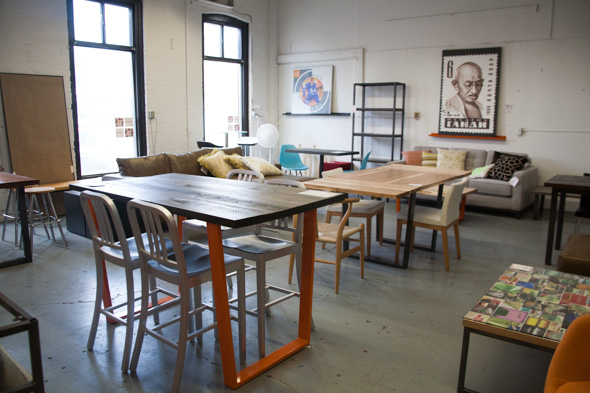 From Brockton Collective, we stop in at Design Republic. They have a flagship store on Queen West, but 442 Dufferin has a showroom where they store sale items. The room is full of tables with vintage wood surfaces, giant mirrors, and mod couches and chairs, among other treasures. This arm of Design Republic also rents out furniture to film people, theatre people, and home stagers decorating for real estate purposes. From there, we trek out to the community garden, where tenants "have meetings and smoke cigarettes."
From Brockton Collective, we stop in at Design Republic. They have a flagship store on Queen West, but 442 Dufferin has a showroom where they store sale items. The room is full of tables with vintage wood surfaces, giant mirrors, and mod couches and chairs, among other treasures. This arm of Design Republic also rents out furniture to film people, theatre people, and home stagers decorating for real estate purposes. From there, we trek out to the community garden, where tenants "have meetings and smoke cigarettes."
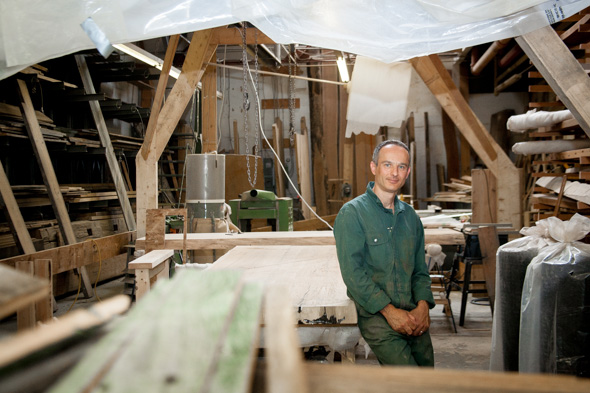 Onward we go to Canadian Salvaged Timber, which reuses and repurposes old boards and beams and other wood structures. There's a pair of 50-year-old doors to a horse stall that I can't stop staring up at, mouth open stupidly. The room smells like musty wood and stain, and founder Lambos Tsaousidis tells us he's working on some tables for the Four Seasons that day. Niagara Custom Lab is around the corner.
Onward we go to Canadian Salvaged Timber, which reuses and repurposes old boards and beams and other wood structures. There's a pair of 50-year-old doors to a horse stall that I can't stop staring up at, mouth open stupidly. The room smells like musty wood and stain, and founder Lambos Tsaousidis tells us he's working on some tables for the Four Seasons that day. Niagara Custom Lab is around the corner.
 They're the last lab in Canada that processes every gauge of film, and one of the last processing plants in the country. There are three darkrooms as part of the set-up. Reels and reels of film are stacked and strewn around the room, interspersed with posters of Batman and X-Men and even a little vintage porn. A sign on the door warns, "No Turkeys."
They're the last lab in Canada that processes every gauge of film, and one of the last processing plants in the country. There are three darkrooms as part of the set-up. Reels and reels of film are stacked and strewn around the room, interspersed with posters of Batman and X-Men and even a little vintage porn. A sign on the door warns, "No Turkeys."
 And, in fact, I didn't see a single turkey throughout the entire visit, but I did meet a lot of artists who seem at home in their space. As the shadows get longer, and as we crunch through the tall grasses of the previously mentioned empty lot, I can't help but feel that the building will be protected by those who make their lives there.
And, in fact, I didn't see a single turkey throughout the entire visit, but I did meet a lot of artists who seem at home in their space. As the shadows get longer, and as we crunch through the tall grasses of the previously mentioned empty lot, I can't help but feel that the building will be protected by those who make their lives there.
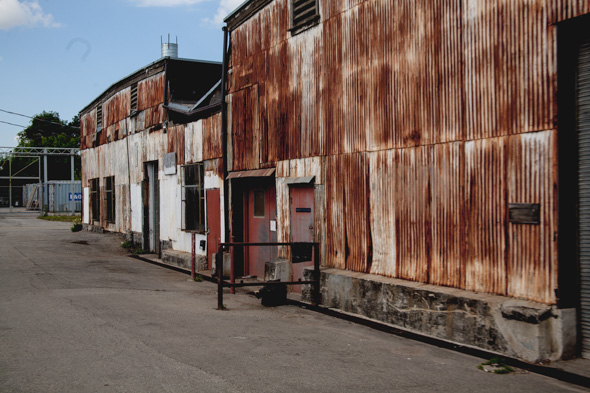 Photos by Denise McMullin.
Photos by Denise McMullin.